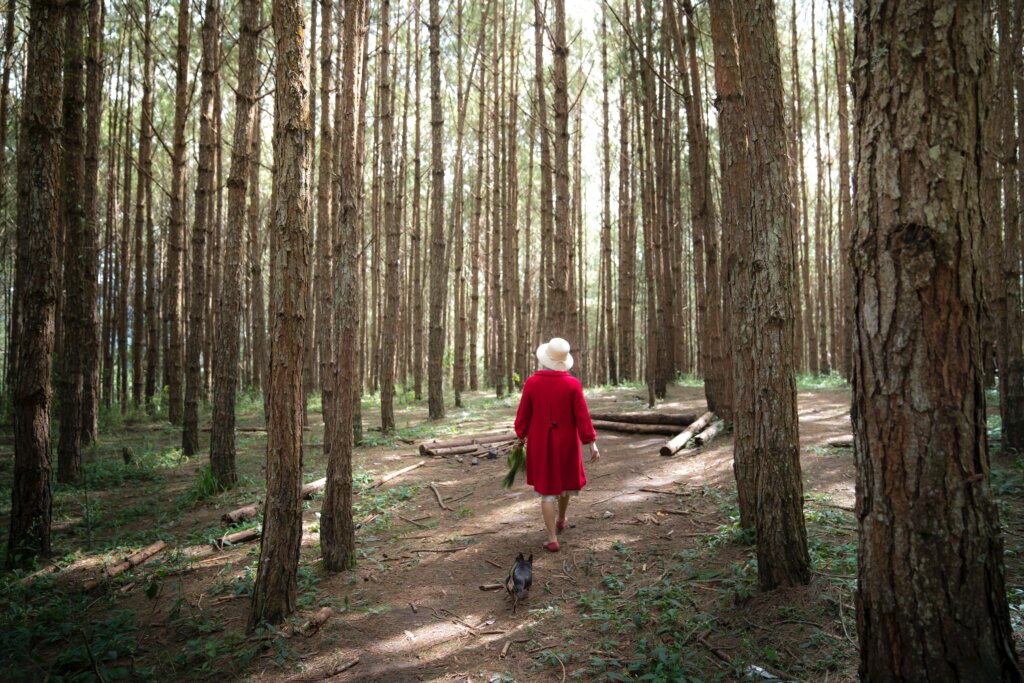
If you’re feeling stressed, run-down, or burnt-out from the demands of our fast-paced world, skip the spa because you might be in need of a forest bath…
Shinrin-yoku, literally ‘taking in the forest atmosphere’, is a Japanese term for the cultural practice known the world over as forest bathing. Forest bathing became a part of Japan’s national public health program in 1982, and the Japanese government has spent millions on scientific research into the practice’s physical and psychological health benefits.
While you might think forest bathing consists of stripping off and swimming in the woods, it’s actually a lot simpler – purely spending time in the bush or any natural landscape will meet the requirements. Any time you walk among trees without distractions or hurrying, ideally for two hours or more, you’re forest bathing.
So what’s the catch? That’s just it – there isn’t one. Just be with trees. No hiking, no counting steps on a Fitbit. You can sit or meander, but the point is to relax rather than accomplish a specific goal. Your next question will probably be: but what good will it do? Thanks to the studies begun in Japan and continued by research facilities in the United States and Europe, there have been numerous investigations into the physical and psychological health benefits of forest bathing.
A study conducted at Japan’s Chiba University compared nearly 300 university-age subjects after they took walks in a city and after they walked in a forest. After the forest walks, the students had lower concentrations of the stress hormone cortisol, lower pulse rates, and lower blood pressure than on the days they walked in the city. Similarly, in a larger study led by researchers from Kyoto University, participants scored lower on ratings for hostility and depression after spending time in nature compared to an urban setting.
Forest bathing isn’t just beneficial for our mood, either. Research from Nippon Medical School found that immuneboosting ‘natural killer’ cells, which help protect against viruses and cancers, showed higher activity levels after subjects went forest bathing, increasing even further after a second day. The cells continued to function at a higher level for more than a week after the experience. While experts aren’t 100% sure what exactly it is that causes these fantastic results, some believe forest bathing’s health benefits come from inhaling phytoncides, the chemicals plants emit to protect themselves from bugs. Others think perhaps the increased feelings of awe generated by the natural landscapes are why forest bathers enjoy better health.
You’ll be pleased to know that there are no specific training or equipment requirements for forest bathing – yourself and your best pair of walking shoes are all you need. Simply find a spot with lots of trees, and take a long, slow walk. While there are no hard and fast rules to forest bathing, here are a few guidelines that will ensure you get the most out of shinrin-yoku:
Go slow, and we mean really slow.
Deliberately slow down. Give yourself time to relax and restore your tired and frazzled mind. By taking things slowly, you’ll have time to truly absorb your surroundings, which will help you de-stress, relax, and reconnect.
Pay attention.
Make a point to take notice of the sounds, sights, and smells around you. Listen in on the conversations of the birds and the insects, or the changing whispers of the breeze in the trees. Paying attention to something in the moment, to the experiences of your senses, brings you firmly into the present. Take advantage of the chance to peer closely at things you wouldn’t normally – the shape of a leaf, or perhaps the varied colours of a single flower.
Disconnect from technology for the time you’re in nature.
It’s hard to let go of your phones, smart watches, and iPods, but trust us – you will find it much easier to really connect with your surroundings if you aren’t pausing to check your Facebook notifications or take a picture to post on Instagram. Relish in the experience without rushing to ‘share’ it with your social media networks. Worried about getting lost? Take your phone but turn it off unless you absolutely need it.
Enjoy the mystery.
Without smart phones to quickly Google what a plant or animal species is, you might feel frustrated by the unknown – but go with it. You may not be able to name it, but what can you notice about its scent, colours, textures or size? Ask yourself why it attracted your attention, and what it is that intrigues you. Wallow in the unknown.
If you’re nervous about heading off into the great wide by yourself, check out websites like Facebook, Eventbrite, and Meetup for planned forest bathing sessions and walking groups in your local area. Otherwise, put on your favourite walking shoes, bring sunscreen and a hat, and escape into the great outdoors for a deeper and clearer intuition, an increased flow of energy, and an overall increase in your sense of happiness and stillness.
WORDS: Nicole Kennedy




















